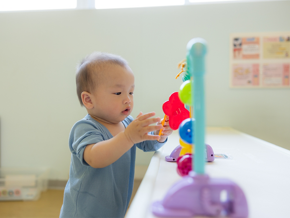
Pedia Shares 3 Major Signs You May Have a Child With Special Needs
You know your little one better than anyone else. So, when you're worried about a delay in talking or frequent meltdowns, trust that instinct. Acting quickly when you have a child with special needs can make a massive difference in their development and future.
3 Situations to Bring to Your Pedia's Attention
ParenTeam had the opportunity to interview Dr. Tricia Ramos, DPPS, a trained ambulatory pediatrician and pediatric primary care specialist. She's preparing to publish a study on consultation trends at the General Pediatrics Clinic of the Philippine General Hospital (PGH) from 2019 to 2023.
Dr. Ramos notes that among the top 10 most common diagnoses observed at the clinic are Autism Spectrum Disorder, Developmental Disorder of Speech and Language, and Global Developmental Delay.
Below, Dr. Ramos takes us through three major red flags that may signal your child may have special needs.
1. Your child is not hitting their developmental milestones.
Every child has their own unique timeline for growth and development. However, there are milestones or skills that most children achieve by a specific age. Local doctors use the American Academy of Pediatrics' (AAP) research on developmental milestones as a guide for their practice.
If a child hasn't hit the milestones that about 75% of other kids their age has reached, it could be a sign of a developmental delay, Dr. Ramos says.
"For example, a child only learned how to take steps on their own at 18 months old. [They can be considered] a 'late bloomer' since the skill can already be observed at 12 to 18 months for 75% of the population.
"But a 2-year-old child who is still unable to take steps on their own is already a sign of developmental delay."
Dr. Ramos recommends downloading the Centers for Disease Control and Prevention (CDC) Milestone Tracker to spot concerns sooner rather than later. This free mobile app allows you to track and observe your child's milestones from 2 months to 5 years of age.
2. Your child struggles to communicate.

The AAP says a delay in joint attention—like not looking back and forth between a toy and a parent to share interest—can be an early sign of autism.
Most people assume communication is about talking, but it includes all the ways a child expresses themselves, including sounds, gestures, facial expressions, and body language.
A toddler who struggles to communicate, even in non-verbal ways, at the age when they should start talking, could be an early sign of special needs.
Dr. Ramos shares, "The most common signs that I encounter from new patients in my practice are delay in expressive speech by age 2 years or more and struggle in participating in school activities by age 5 years or more."
3. Your child doesn't respond or react as expected for their age.
As your child grows, they're expected to imitate actions or sounds and engage in imaginative or pretend play. They should also be able to understand simple verbal instructions. If you're not seeing them, there could be a problem.
Dr. Ramos says, "A child with a possible auditory or hearing impairment may also show absence of response to loud sounds or the mother’s voice. Later on in infancy, the child may show signs such as lack of eye contact or fixation to faces especially the mother, lack of social smile, or lack of early vocalizations like cooing and babbling during interactions."
What Pediatricians Want You to Know
Based on her experience, Dr. Ramos shared that most parents don't bring their children in for evaluation until they’re around 5 years or older. By then, the signs have usually become harder to ignore, often flagged by teachers once the child starts school.
Getting help early is always better for a child with special needs. As the CDC points out, a baby’s brain is most adaptable in the first three years of life. This is when vital connections are formed that support learning and behavior. As children grow, these connections become more fixed, making it harder to change them.
Take to heart these suggestions from Dr. Ramos to help ensure that children with special needs get the early support they need.
1. Keep all scheduled well-child visits with your pedia.
Well-child visits aren't just about ensuring your child is on schedule with their immunizations. Your pediatrician monitors your child's growth and development, from ensuring proper nutrition to screening for illnesses. And they can spot signs of developmental delays that parents can miss.
Dr. Ramos shares that you should ideally bring your child to the pediatrician for checkups during these times:
- Newborn stage
- 1 and 2 months old
- 4 and 6 months old
- 9 and 12 months old
- 15 and 18 months old
- 2, 2.5, and 3 years old
After your child's third birthday, well-child visits should be conducted annually until your child reaches the age of 18.
Dr Ramos says they perform routine checks for developmental screening and surveillance using a set of standardized tools. Pediatricians use them when kids are 9, 18, 24, and 30 months old, and then every year after that, as recommended by the Philippine Society for Developmental and Behavioral Pediatrics.
2. Be careful about the "late bloomer" label.

The National Institute of Child Health and Human Development states that a child with a learning disability, such as dyslexia, may struggle to recognize words they already know.
Dr. Ramos says she's had parents and grandparents compare a child's development to their own experiences. "For example, they might say, 'Parehas lang sa Daddy niya, late rin nagsalita nung bata pa,' when they notice delays."
Dr. Caly Tongson-Madariaga, a neurodevelopmental and behavioral pediatric specialist in Quezon City and a colleague of Dr. Ramos, says parents need to have an "early signs, act early" mindset.
"We don't recommend dismissing [signs of delay] with a 'late bloomer' or a 'wait and see' approach," Dr. Tongson-Madariaga says. "If a child has not met milestones that 75% of peers have already achieved, or if there are concerns about regression, unusual patterns, or loss of skills, we highly recommend developmental screening and/or referral for further evaluation rather than waiting."
3. Children with special needs require care from a team of different experts.
Many parents who suspect they have a child with special needs assume they only need developmental and behavioral pediatricians. But, in reality, it requires multidisciplinary care.
Dr. Ramos explains, "There can actually be a dedicated team that can identify and evaluate these signs early on and provide early intervention, even before getting seen by the developmental and behavioral pediatric specialist.
"It's the team's responsibility to recommend and provide parent counseling, training, and early developmental and educational intervention even before a formal evaluation by the developmental and behavioral pediatrics specialist is received."
This team includes:
- General pediatrician
- Pediatric rehabilitation medicine specialist
- Occupational therapists
- Physical therapists
- Speech and language pathologists
- Developmental and educational intervention specialists or SPED teachers
You can also locate a developmental pediatrician using the online directory of the Philippine Society for Developmental and Behavioral Pediatrics.
4. You can make a difference in your child's growth and development.
You become better at meeting your child's special needs when you work with healthcare providers. They can provide you with advice tailored to your child's level of development.
"These general interventions, if done regularly and routinely, could help a lot in supporting the child’s progress," Dr. Ramos says. "Paying attention to the child more, playing and learning with them, and avoiding screentime, are just some of the tips and techniques we coach parents to do."
During Dr. Ramos's fellowship training in Ambulatory Pediatrics at PGH, she discovered how resilient and resourceful families and communities can be when equipped with proper coaching and training.
"My favorite and most memorable patient, who was 6 years old at the time, clearly had signs of non-verbal Autism Spectrum Disorder and was on the waitlist for the specialists and therapy services. She came to me in PGH with her lola.
"Financial resources were scarce, but every follow-up, the lola would bring me a list of new words her granddaughter learned and tasks she could do without formal therapy sessions. Lola told me that she would sit down with the parents of the child’s classmates in SPED in the public school system, and she would ask for tips and learn from them how to teach and care for her granddaughter."
Raising a child with special needs can feel overwhelming, but getting the proper support early on can make a big difference for you and your child. Keep in mind that no single sign confirms anything on its own.
But when the same struggles keep showing up, it's time to move on from the wait-and-see approach. You're not being OA or overthinking. You're being a parent who’s paying attention.
Do you have a child with special needs? How did you find out? Share your insights on the ParentTeam Moms and Dads Facebook group.
References
“3 Early Signs of Autism Spectrum Disorder (ASD),” HealthyChildren.org, n.d., https://www.healthychildren.org/English/health-issues/conditions/Autism/Pages/Early-Signs-of-Autism-Spectrum-Disorders.aspx.
“Eunice Kennedy Shriver National Institute of Child Health and Human Development - NICHD,” accessed August 4, 2025, https://www.nichd.nih.gov/health/topics/factsheets/learningdisabilities.
“Training Module 2 | Watch Me! | Learn the Signs. Act Early. | NCBDDD | CDC.” Accessed August 4, 2025. https://www.cdc.gov/ncbddd/watchmetraining/module2.html.
“What Is a Developmental Milestone?,” Centers for Disease Control and Prevention, September 26, 2024, https://www.cdc.gov/ncbddd/actearly/milestones/index.html.
ZERO TO THREE, “CDC’s Learn The Signs: Identifying Developmental Delays Early,” January 28, 2025, https://www.zerotothree.org/resource/journal/cdcs-learn-the-signs-act-early-developmental-milestone-resources-to-improve-early-identification-of-children-with-developmental-delays-disorders-and-disabilities/.
Zubler, Jennifer M., Lisa D. Wiggins, Michelle M. Macias, Toni M. Whitaker, Judith S. Shaw, Jane K. Squires, Julie A. Pajek, et al. “Evidence-Informed Milestones for Developmental Surveillance Tools.” PEDIATRICS, February 8, 2022. https://doi.org/10.1542/peds.2021-052138.




























